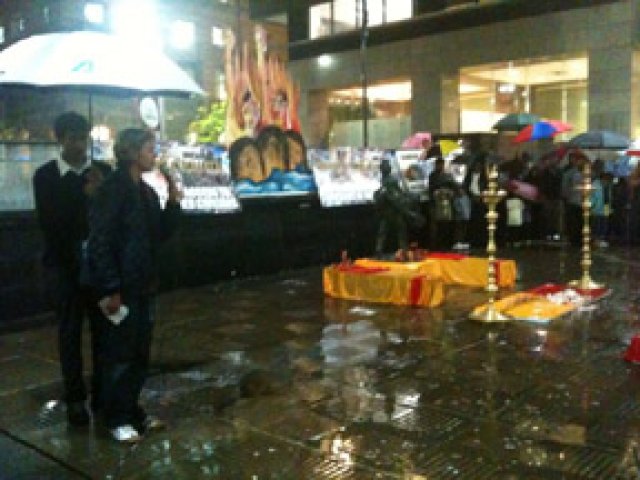
Hundreds of Tamils turned out in Sydney’s Martin Place on May 18 to mark the first anniversary of the Sri Lankan army’s capture of the last bit of land held by the pro-independence Liberation Tigers of Tamil Eelam in the north-east of the country.
In driving rain, families lined up to place petals in front of a statue of a grieving mother. They heard from community speakers, the Greens, the Council for Civil Liberties (CCL) and the Socialist Alliance.
Reflecting on the massacre by the Sri Lankan army, in which tens of thousands were killed, the gathering also resolved to continue the struggle for Tamil justice and self-determination.
Greens MLC Lee Rhiannon promised to press the Australian government to do more for the Tamil people.
Lawyer Stephen Blanks, who is assisting Tamils with claims for asylum, also pledged to support the community’s efforts.
Pip Hinman said the Socialist Alliance would continue campaigning for the Tamil people’s right to a separate, and safe, homeland.
A similar gathering in Melbourne also drew several hundred Tamils.
Some of the participants in the commemoration were Tamil refugees who had spent months in detention on Christmas Island before eventually being granted refugee visas by the Australian government.
Soma Ilangovan from the US-based Tamil American Peace Initiative, said in a May 17 Foreign Policy article that as many as 93,000 Tamils remain in detention camps and transit centres, while 11,700 more (of which 550 are children) are being held as ex-combatants without charges, denied access to legal assistance.
The article noted: “Conditions in the camps and prisons are appalling, with human rights groups documenting cases of torture and rape, in addition to poor housing, health, sanitation and education facilities … More than 1.5 million landmines contaminate the north of the country … Land seized during the conflict has not been returned, and fishing rights have not been restored.
“More ominously, President Mahinda Rajapaksa’s government has made no headway in advancing the essential freedoms and political reforms necessary for true reconciliation, like political power-sharing and decentralisation.”